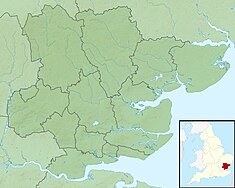Comarques, Thorpe-le-Soken
| Comarques | |
|---|---|
| Type | House |
| Location | Thorpe-le-Soken, Essex |
| Coordinates | 51°51′36″N 1°09′26″E / 51.8599°N 1.1571°E |
| Built | mid-18th century |
| Architect | Robert Taylor, attributed |
| Architectural style(s) | Queen Anne |
| Governing body | Privately owned |
Listed Building – Grade II* | |
| Official name | Comarques |
| Designated | 29 April 1952 |
| Reference no. | 1112108 |
Comarques is an 18th century country house in Thorpe-le-Soken, Essex, England. It has been attributed to the architect, Sir Robert Taylor. Named after Captain Comarque, a Hugenot refugee who owned the estate in the early 18th century, the house is in the Queen Anne style. The author Arnold Bennett lived at Comarques between 1913 and 1921. There is a tradition that Clement Attlee lived at the house as a child, but Historic England does not support this claim. Comarques is a Grade II* listed building.
History
Captain Comarque was a French Hugenot refugee who, along a number of others, settled in Thorpe-le-Soken in the early 18th century. Historic England confirms that he was resident in the area in 1717 but that he did not build the house.[1] Pevsner notes the attribution to Sir Robert Taylor, an architect who worked mainly in London and the South-East of England.[2] The building carries a brick datestone for 1755, with the name W. Whatey, who was probably the main building contractor for the house.[1] Local tradition suggests that the house was the childhood home of Clement Attlee, later prime minister, having been bought by his father, Henry, in the late 19th century, and this tradition is repeated in some sources.[3] However, Historic England notes that Attlee's official biographer does not support the claim and suggests that Henry Attlee, a solicitor, was involved in the sale of the estate rather than its purchase.[a][1]
In 1913, Comarques was bought by Arnold Bennett, then one of England's most successful novelists, from his considerable literary earnings.[6] Soon after the purchase, Bennett wrote to an American correspondent; "we now possess an early Queen Anne house near the Essex coast and in February are going to install ourselves there definitely for everlasting".[7] During his tenure, which lasted until his separation from his wife in 1921,[8] Bennett amassed a considerable art collection, which was displayed at the house.[b][9]
The estate was later owned by Albert Fairfax, 12th Lord Fairfax of Cameron.[10] In 2010 the house was on the market.[11][12]
Architecture and description
The house is of two storeys, with attics, in Flemish-bond red brick. One brick carries the date 1755. The style is Queen Anne. There are extensions from the 19th and 20th centuries.[1] The house has seven bays and Pevsner notes the distinctive window style, which has been called Chinese Chippendale,[12] and which is the main grounds for the attribution to Taylor.[2] Comarques is a Grade II* listed building.[1]
Footnotes
- ^ Supporters of the claim for Attlee's ownership include Roy Jenkins who, in his 1948 biography of Clement Attlee, dates Henry Attlee’s purchase to 1897,[4] and the draft Victoria County History for Essex which records Henry Attlee as owner from 1898 to 1906.[5]
- ^ Bennett also modernised the house, including the installation of a number of bathrooms, which was uncommon for the time. The letter to his American correspondent imagines prospective purchasers visiting the house after his death; "[the] landed gentry will wonder why the madman had 3 bathrooms in a home so small; they will not know that it was due solely to a visit to the U.S.A.".[7]
References
- ^ a b c d e Historic England. "Comarques (Grade II*) (1112108)". National Heritage List for England. Retrieved 7 June 2020.
- ^ a b Bettley & Pevsner 2007, p. 780.
- ^ "Comarques". DiCamillo - British and Irish Country Houses. Retrieved 7 June 2020.
- ^ Jenkins 1948, p. 4.
- ^ "Land Ownership: Thorpe-le-Soken" (PDF). Victoria County History. Retrieved 7 June 2020.
- ^ Swinnerton, Frank. "Bennett, (Enoch) Arnold (1867–1931)", Dictionary of National Biography, Oxford University Press, 1949. Retrieved 1 June 2020 (subscription or UK public library membership required)
- ^ a b Drabble 2012, p. 192.
- ^ Drabble 2012, p. 261.
- ^ "Arnold Bennett: 'Popularizer of high art and educator of public taste'". artuk.org. Art UK. Retrieved 7 June 2020.
- ^ "Letters from Teresa, Lady Berwick 1936". Shropshire County History. Retrieved 7 June 2020.
- ^ "A few careful owners: historic country houses for sale". Country Life. 15 April 2010.
- ^ a b Binney, Marcus (28 May 2010). "Comarques is an Essex beauty with a Chinese twist". www.thetimes.co.uk. The Times.
Sources
- Bettley, James; Pevsner, Nikolaus (2007). Essex. The Buildings of England. New Haven, US and London: Yale University Press. ISBN 978-0-300-11614-4.
{{cite book}}: CS1 maint: ref duplicates default (link) - Drabble, Margaret (2012) [1974]. Arnold Bennett: A Biography. New York, US: Faber and Faber. ISBN 978-0-571-28746-8.
{{cite book}}: CS1 maint: ref duplicates default (link) - Jenkins, Roy (1948). Mr. Attlee: an interim biography. London: Melbourne. OCLC 1141185790.
{{cite book}}: CS1 maint: ref duplicates default (link)

